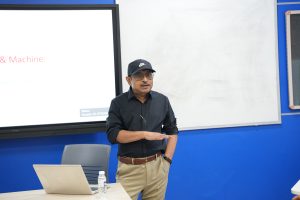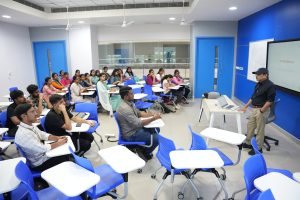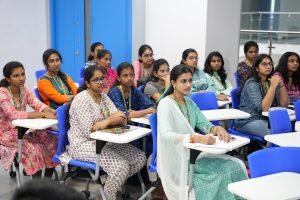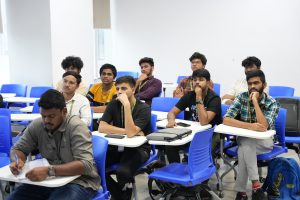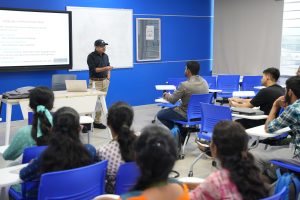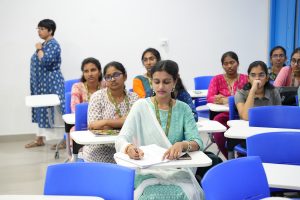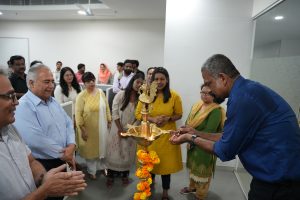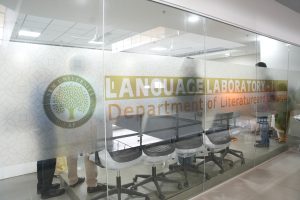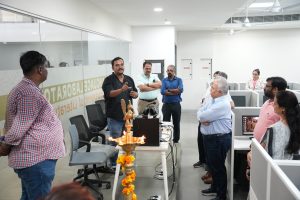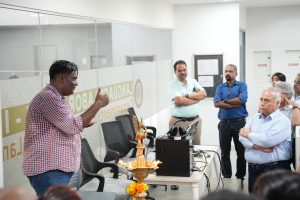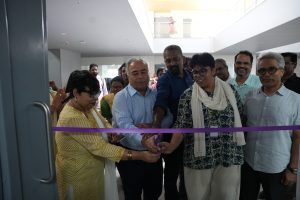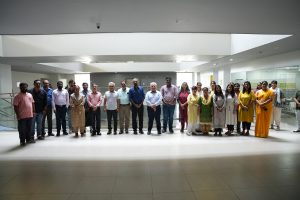Bridging Minds and Machines: A Guest Lecture on Language Processing
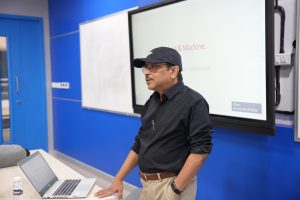 The Department of Literature & Languages hosted a guest lecture for students enrolled in the open elective course “Decoding Language,” which is based on Neuro-Linguistic Programming (NLP). The lecture took place on October 14 and 15, 2024 and featured Dr Debdarsan Niyogi, an authority in Artificial Intelligence, Machine Learning, and Generative AI.
The Department of Literature & Languages hosted a guest lecture for students enrolled in the open elective course “Decoding Language,” which is based on Neuro-Linguistic Programming (NLP). The lecture took place on October 14 and 15, 2024 and featured Dr Debdarsan Niyogi, an authority in Artificial Intelligence, Machine Learning, and Generative AI.
Dr Niyogi’s lecture, titled “Mind & Machine: How Language is Processed,” focused on the intersection of human cognition and artificial intelligence in language processing. He provided in-depth insights into how natural language processing (NLP) algorithms enable machines to interpret and generate human language. The sessions bridged the gap between human linguistic abilities and machine learning models.
Students gained valuable knowledge about the parallels between human and machine language processing. They learned about the complexities of NLP and its real-world applications in AI, data science, and machine learning. This understanding will not only enhance their grasp of neuro-linguistic programming but also prepare them for future endeavours in the growing field of AI-driven language technologies.
- Published in Departmental News, English news, News
The Vision of ‘Moner Manush’ through the Lens of Dr Sayantan’s Research
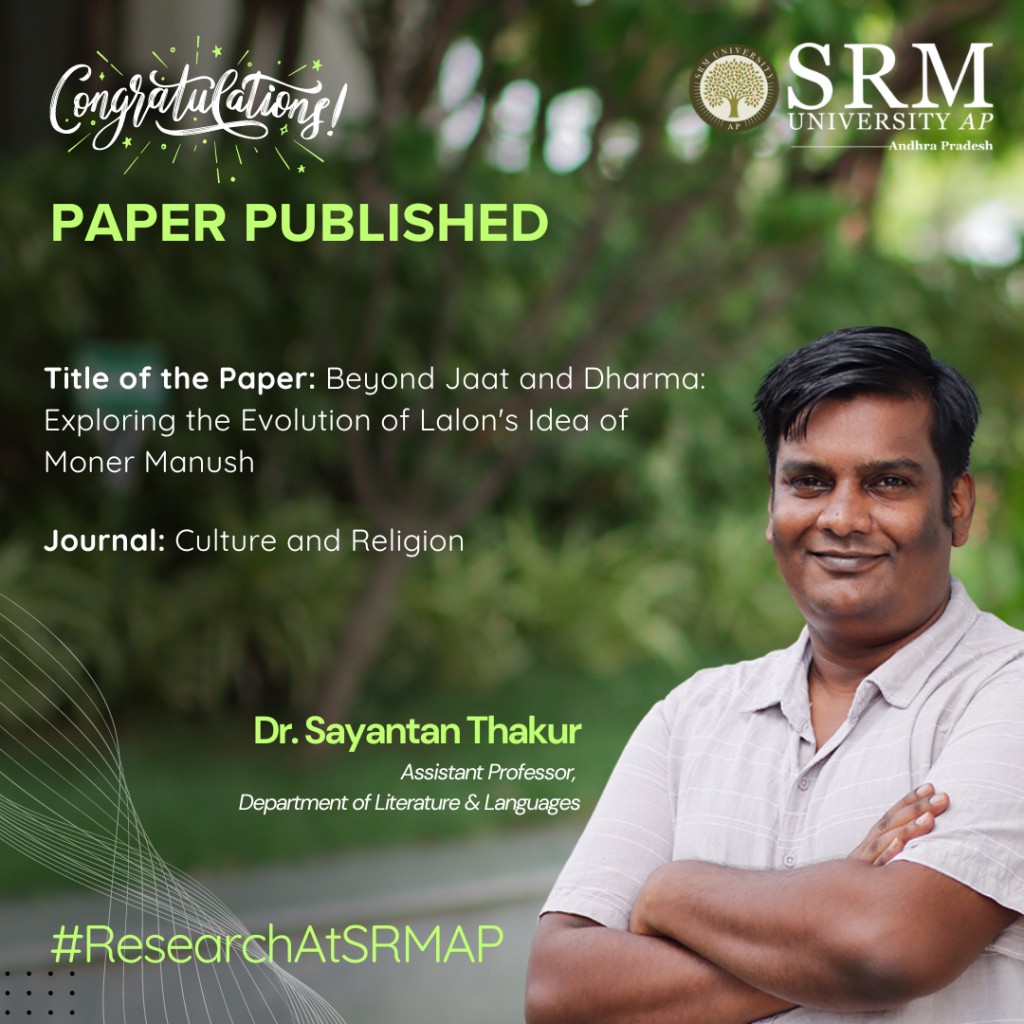
Today, we approach the topics of caste and religion with great sensitivity, aware of the deep-rooted complexities they carry. Yet, here was a character who transcended these societal boundaries, evolving into the embodiment of ‘Moner Manush’—a figure who rose above the constraints of identity to embrace a higher sense of spiritual unity and inclusiveness. Dr Sayantan Thakur, Assistant Professor at the Department of Literature and Languages closely reads into the intricacies of Lalon’s conceptualisation of man and the caste barriers in his research paper.
Abstract:
The paper entitled ‘Beyond ‘Jaat’ and Dharma: Exploring the Evolution of Lalon’s Idea of ‘Moner Manush’ delves into an in-depth exploration of Lalon’s conceptualization of ‘Moner Manush,’ transcending the conventional confines of ‘Jaat’ (caste) and Dharma (religion). Through a nuanced analysis of Lalon’s evolving perspectives, the study traces the transformative journey of the idea of ‘Moner Manush.’ By dissecting the lyrical and philosophical aspects, the paper illuminates how Lalon’s spiritual musings challenge societal norms, promoting a universal ethos that goes beyond distinctions. This inquiry aims to unravel the evolving nature of Lalon’s concept of ‘Moner Manush’ and its enduring significance in fostering inclusivity and spiritual interconnectedness, surpassing the limitations of caste and religion.
Practical Implementation and Social Implications:
The practical implementation of my research on “Beyond ‘Jaat’ and Dharma: Exploring the Evolution of Lalon’s Idea of ‘Moner Manush'” has profound social implications, particularly in fostering inclusivity and breaking down societal barriers. By promoting Lalon’s vision of transcending caste (jaat) and religious (dharma) divisions, this research advocates for a more egalitarian society where people are valued for their inner virtues, not external identities. In practical terms, this philosophy can be integrated into education, community-building, and social reform initiatives to encourage tolerance, empathy, and unity among diverse groups.
In multicultural societies, teaching Lalon’s ideas in schools and community programs can help dismantle deep-seated prejudices and promote cross-cultural understanding. Socially, the emphasis on the Moner Manush—the ideal human being—can encourage individuals to focus on self-reflection, moral development, and compassion, creating a more harmonious coexistence. Additionally, his philosophy can inform contemporary debates on identity politics, helping people prioritize human connections over rigid societal structures.
Future Research Plans
Regional Literature in Translation
Tantric Tradition and Eastern Indian Literature
Folk Music of Bengal
Indian Philosophy, Aesthetics & Literature
- Published in Departmental News, English Current Happenings, English news, News, Research News
Revisiting Clément Baloup’s Comics through Dr Gusain’s Research
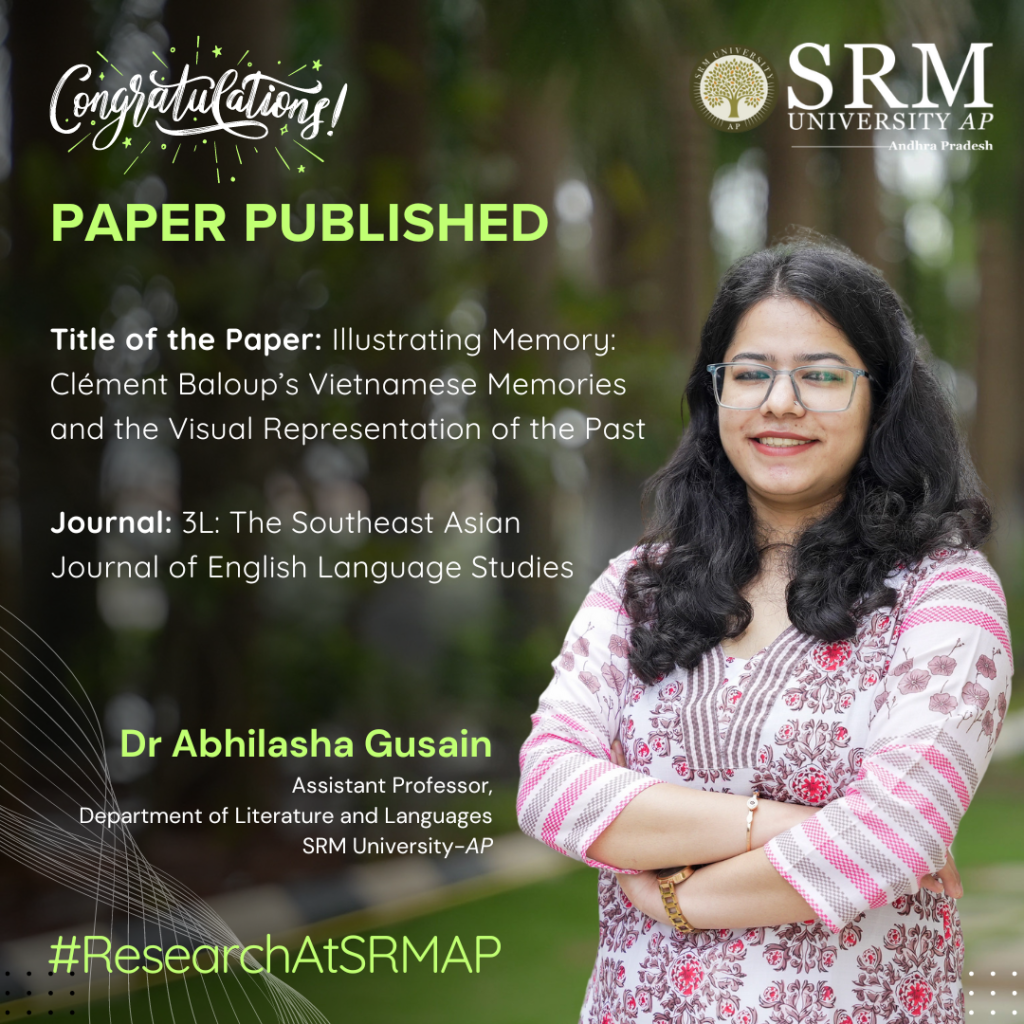
SRM University-AP is proud to announce that Dr Abhilasha Gusain, Assistant Professor in the Department of Literature and Languages has made an outstanding contribution to the academic world with her recent publication. Her research paper, “Illustrating Memory: Clément Baloup’s Vietnamese Memories and the Visual Representation of the Past,” featured in 3L: The Southeast Asian Journal of English Language Studies, a Q1-ranked journal known for its high impact in the field.
Abstract
The present study aims to highlight the role that Clément Baloup’s comics, Vietnamese Memories: Leaving Saigon (Volume 1) and Vietnamese Memories: Little Saigon (Volume 2), play in the creation of an alternate archive that validates the forgotten tales and the memories of a neglected past. These texts provide an alternate form of remembrance by materialising the past in the form of images. The two volumes present the unheard experiences of the Vietnamese diaspora that Baloup recorded during his travels to the different parts of France and the U.S. Such experiences bring to the forefront memories that are otherwise kept at the margins or suppressed by the dominant discourse. If not recorded, they will be lost forever. The counter-memory, thus, calls for a reassessment of the idea of a singular past that denies the marginalised memories. It claims representation and restoration in the cultural memory. As works of postmemory, these texts form a link between the past and the present through mediation and give memorability to unremembered accounts. The memories are illustrated, and hence, visual representation becomes important to the task of postmemory here.
Explanation of the Research:
This study emphasises the significance of visual representation in postmemory, showing how the two graphic narratives create a space for counter-memory and contribute to a reassessment of cultural memory by including marginalised experiences. Postmemory is a term used to describe how the memories of one generation are shaped by the stories and experiences of the previous generation. It often relates to events that people haven’t directly experienced, like wars or significant historical events, but feel a strong connection to through family stories, photographs, or cultural narratives. The paper illustrates how Baloup’s works serve as an alternate archival repository, creating a dynamic and inclusive cultural memory that reflects the complex, polyphonic nature of human experience; thus contributing significantly to the fields of comics studies and memory studies.
- Published in Departmental News, English Current Happenings, English news, News, Research News
Language Lab to Boost Student Communication Skills
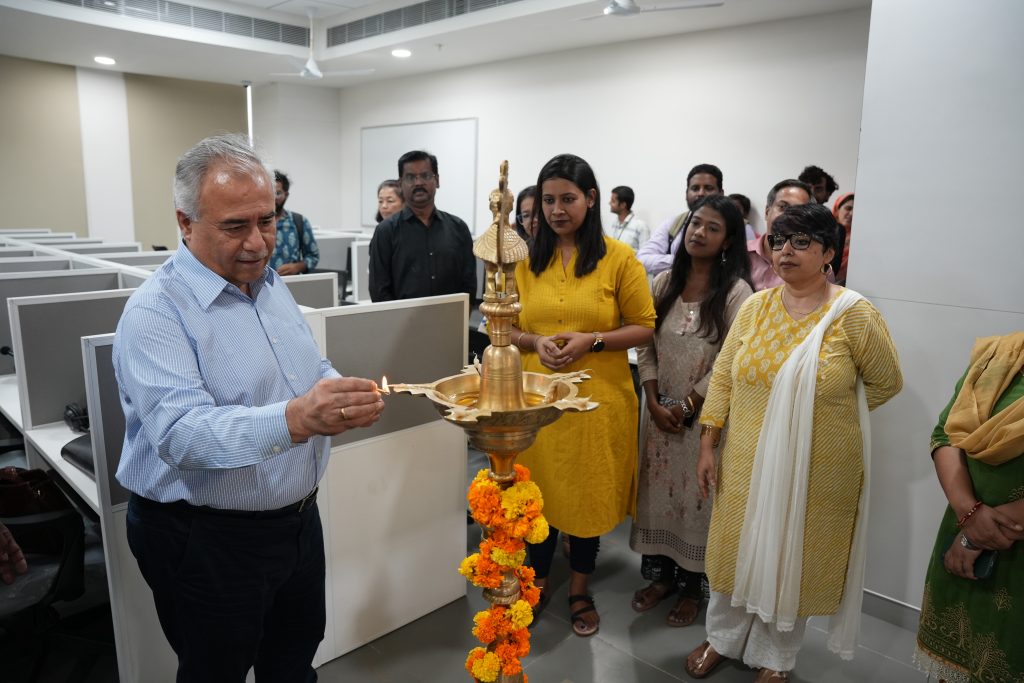 The Department of Literature and Languages at SRM University-AP celebrated the launch of its Language Lab, a state-of-the-art, 70-seater facility designed to enhance the Listening, Speaking, Reading, and Writing (LSRW) skills of its students.
The Department of Literature and Languages at SRM University-AP celebrated the launch of its Language Lab, a state-of-the-art, 70-seater facility designed to enhance the Listening, Speaking, Reading, and Writing (LSRW) skills of its students.
The inauguration was witnessed and officiated by the honourable Vice Chancellor, Prof. Manoj K Arora, along with Prof. Vishnupad, Dean- ESLA; Prof. C V Tomy, Dean-SEAS, Dr Vinayak Kalluri, Dean-Academic Affairs, Ms Suma N, CFAO; Dr Sayantan Thakur, Assistant Professor and Head; Dr Karthik Rajendran; Dr Srabani Basu, other faculty members, research scholars and students.
The laboratory, valued at 10 million rupees, is equipped with Sanako and Lanquill software, providing students with access to advanced resources. During the event, Vice Chancellor Prof. Manoj K Arora emphasised the value of communication he stated “Communication is an essential skill. With this lab, our students have a real opportunity to build those skills and contribute meaningfully to society.” he also voiced that, In future, the varsity will also be looking forward to opening this facility to the wider community so that more people can benefit from this resource.
Dr Thakur and Dr Amlan Baisya, Assistant Professors at the university, provided insights into the laboratory’s cutting-edge software and technology. They explained how these tools can significantly enhance the learning experience, making language acquisition more interactive and engaging. The faculty expressed their excitement about the opportunities this facility will create for both students and instructors alike.
Prof. Arora took a moment to commend the Department of Literature and Languages and the Directorate of Information Technology and Knowledge Management (ITKM) for their commitment to advancing education through innovative resources. He underscored the bright future ahead, not only for students but for the entire university community, as they leverage this new laboratory to improve communication skills that are vital in both academic and professional settings.
- Published in Departmental News, English Current Happenings, English news, News
Dr Sayantan’s Research Paper on Overcoming the Digital Divide
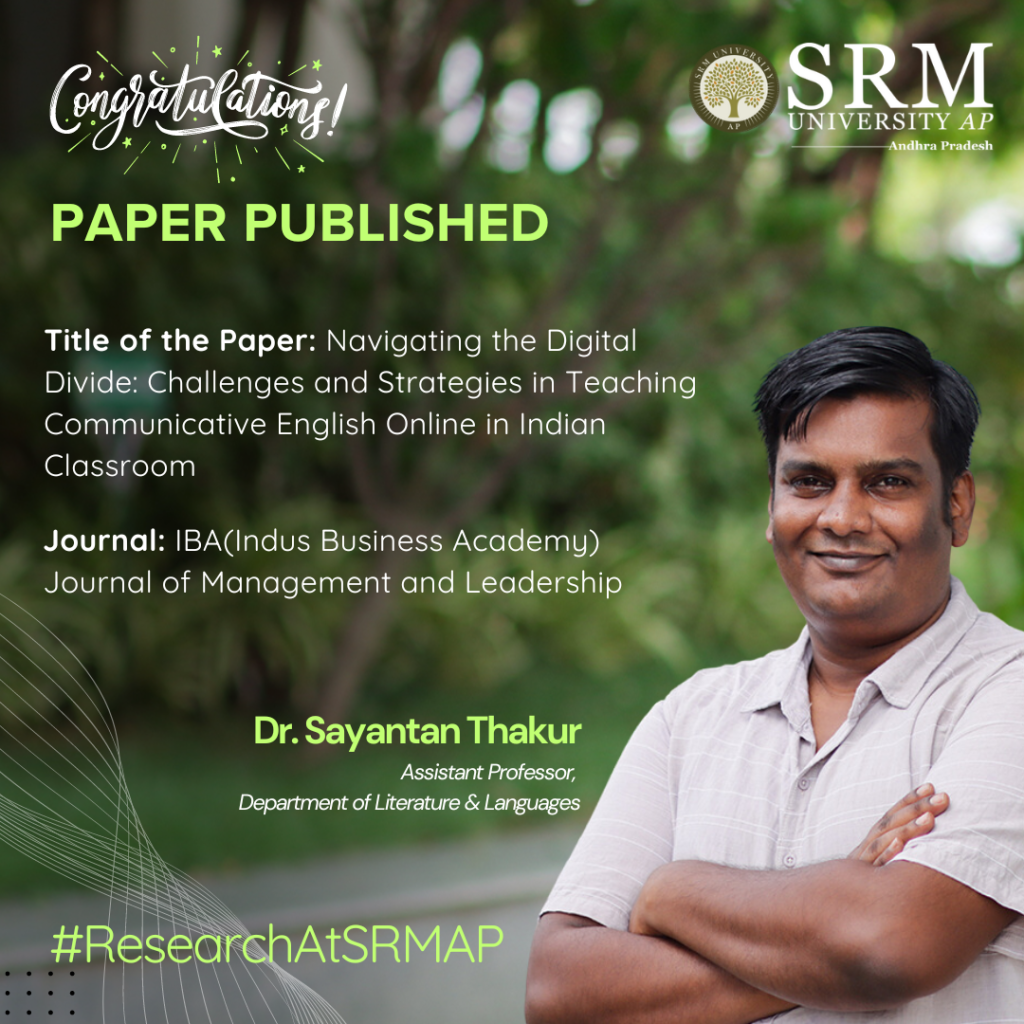
In the context of online English education in India, the “digital divide” has emerged as a significant obstacle, especially for students from rural or underprivileged areas. Dr Sayantan Thakur, Assistant Professor at the Department of Literature and Languages in his article introduces a research study titled “Navigating the Digital Divide: Challenges and Strategies in Teaching Communicative English Online in Indian Classrooms,” which aims to address the unequal access to online learning tools.
Abstract
The advent of online learning platforms is providing new opportunities for English language learning (ELL) in India. However, there is a significant challenge posed by the digital divide – the gap in accessing technology. This study investigates what causes the digital divide in internet ELL classrooms such as infrastructure limitations, device ownership and usage, and digital literacy skills; and how they affect student engagement, development of communication skills, and overall learning experiences. It suggests ways to bridge this gap which include government policies on infrastructure development; affordable tech solutions like mobile apps; teaching programs that enhance digital literacy among learners; support for teachers involved in web-based pedagogy. Through these recommendations, education stakeholders can create an inclusive cyberspace for all students where their communication abilities will be nurtured throughout different parts of India.
The Practical Implementation
The practical implementation of your research on “Navigating the Digital Divide: Challenges and Strategies in Teaching Communicative English Online in Indian Classrooms” has far-reaching social implications. By addressing the digital divide, your work can help level the playing field in education, especially for students from underprivileged backgrounds.
Improved Access to Education: Implementing strategies like infrastructure development, affordable mobile-based learning tools, and digital literacy programmes can provide more students, especially in rural and low-income areas, access to online English learning resources. This improves their chances of acquiring essential communication skills, opening doors to better job opportunities.
Empowering Teachers: Equipping teachers with digital tools and training enables them to deliver more effective online lessons, increasing student engagement and success rates.
Reducing Inequality: Bridging the technology gap can reduce educational disparities between urban and rural areas, promoting social mobility and reducing the long-term impacts of inequality.
Building a Digitally Literate Society: Enhancing digital literacy among students and teachers fosters a society better prepared for the demands of the modern workforce, ultimately contributing to economic growth and social inclusion.
Future Research Plans
- Regional Literature in Translation
- Tantric Tradition and Eastern Indian Literature
- Folk Music of Bengal
- Indian Philosophy, Aesthetics & Literature
- Published in Departmental News, English Current Happenings, English news, News, Research News
A Look into Sequential Art: Exploring Sean Michael Wilson’s Graphic Creations
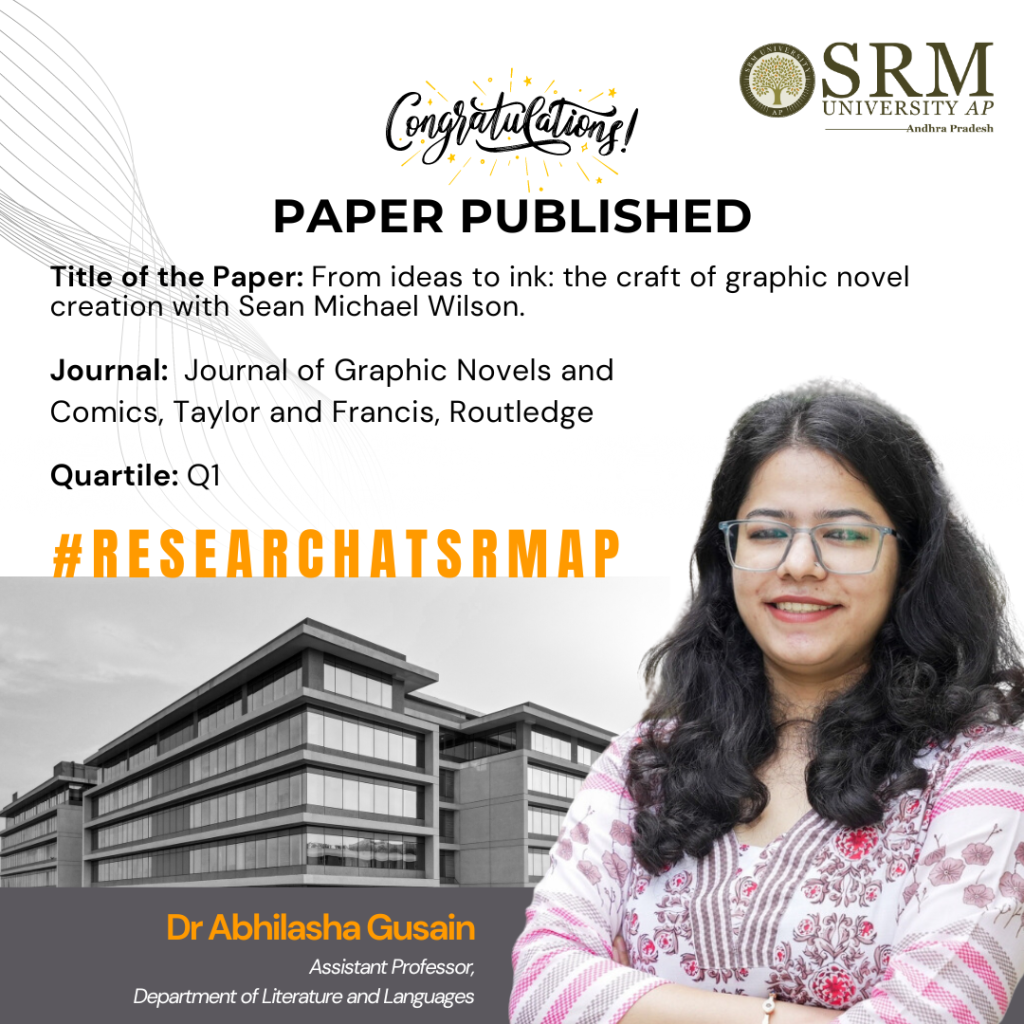
Graphic novels, a subgenre of comics, have witnessed stellar growth in popularity, encouraging readers to decipher meaning from the text and the images. The combination of visual and textual storytelling aids readers in decoding complex narratives. Dr Abhilasha Gusain, Assistant Professor from the Department of Literature and Languages, has published a paper titled “From Ideas to Ink: The Craft of Graphic Novel Creation with Sean Michael Wilson” in the Journal of Graphic Novels and Comics.
The current research advances the field of comics studies, highlighting aspects related to the industry like readership, publication, and distribution of graphic narratives across the globe. It emphasises the process of creation of a graphic novel, with reference to author Sean Michael Wilson’s works.
Abstract
In this interview, Sean Michael Wilson delves into his multifaceted career as a graphic novel writer, revealing the intricacies of his creative process, the challenges of adapting complex subjects into visual narratives, and the evolving role of graphic novels in cultural discourse. With over 40 projects under his belt, Wilson shares his approach to beginning new works, whether they stem from original ideas or/are adaptations of historical events and existing literature. He discusses the balance between authenticity and readability, the importance of research, and the collaborative dynamic between writer and artist in bringing graphic novels to life. Wilson also touches on the broader implications of graphic novels in education and social commentary, the economic realities of the industry, and the impact of digital platforms on publishing. His experiences across different cultures, particularly between the West and Japan, provide insight into the global reception of his work. Throughout the interview, Wilson emphasises the power of graphic novels as a medium for storytelling, education, and political engagement.
- Published in Departmental News, English Current Happenings, English news, News, Research News
Dr Basu Pens a Book on Life’s Boulevard
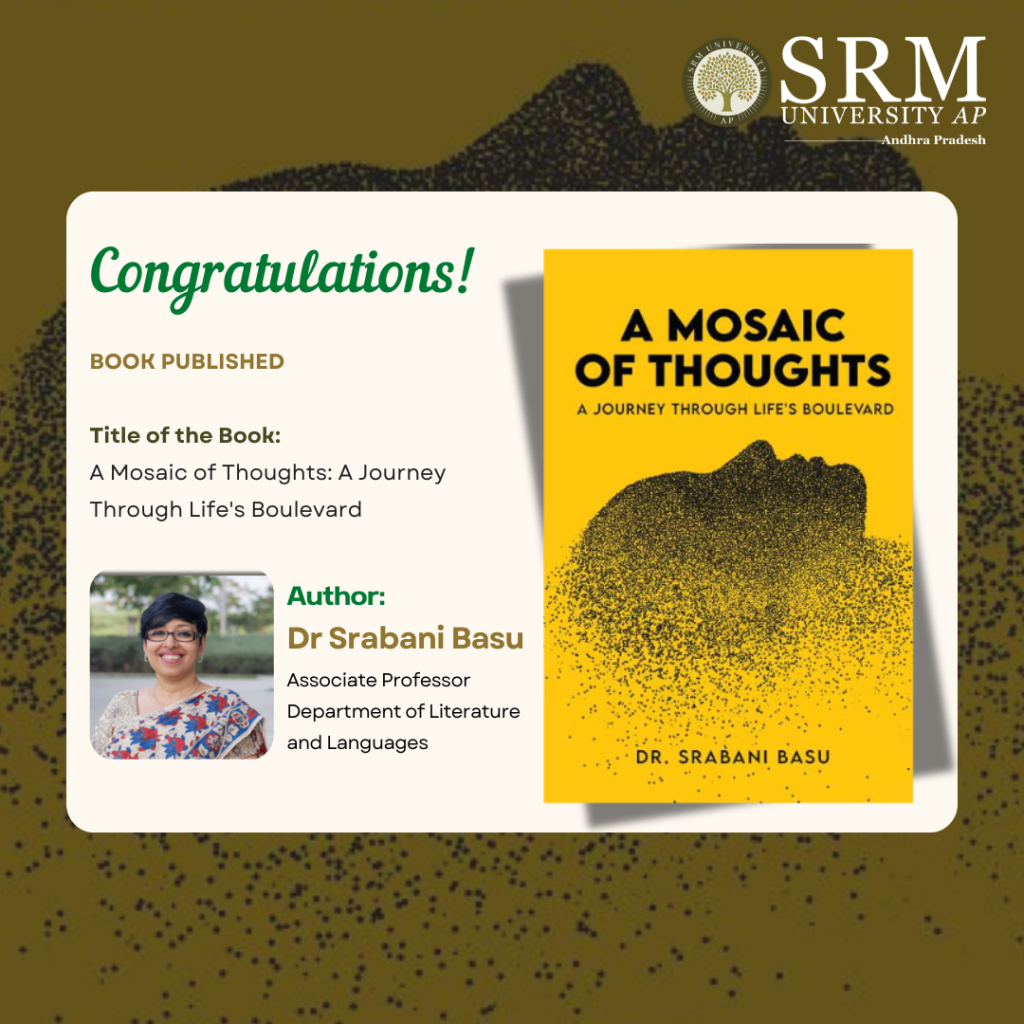 In the esteemed corridors of academia, where the pursuit of knowledge intertwines with the art of mentorship, Dr Srabani Basu emerges as a figure of inspiration and innovation. Nestled within the vibrant community of SRM University-AP. Dr Basu is not just an Associate Professor in the Department of Literature and Languages, but a beacon of intellectual and administrative prowess. Her recent publication, A Mosaic of Thoughts: A Journey Through Life’s Boulevard, is a book of 12 insightful articles that recount interesting snippets of life and experiences both in Academia and Corporate.
In the esteemed corridors of academia, where the pursuit of knowledge intertwines with the art of mentorship, Dr Srabani Basu emerges as a figure of inspiration and innovation. Nestled within the vibrant community of SRM University-AP. Dr Basu is not just an Associate Professor in the Department of Literature and Languages, but a beacon of intellectual and administrative prowess. Her recent publication, A Mosaic of Thoughts: A Journey Through Life’s Boulevard, is a book of 12 insightful articles that recount interesting snippets of life and experiences both in Academia and Corporate.
Abstract:
Dive into “Mosaic of Thought,” a captivating collection of 12 insightful articles exploring the intricacies of contemporary life. This book challenges conventional thinking with themes such as “Are We Manufacturing Countless Bricks in the Wall?” questioning conformity in education and society, and “Of Apes, Leaders, and Organisations,” delving into the primal roots of leadership. Navigate learning complexities in “Is Your Map Meeting Your Learner’s Map?” and confront harassment in “Bullies of All Colours.” Discover the culture of blame in “Blame is the Name of the Game,” and re-imagine cartoons with “Re-discovering Tom and Jerry Through a Quantum Lens.” Each article offers unique perspectives, from fleeting moments in “The Irreplaceable Moments Explored” to impactful first impressions in “Of Halos and Horns.” With humour and seriousness, “A Comedy of Ctrl C and Ctrl V” critiques digital originality, while “Echoes of Influence: A Caveat” warns of the impact of words. This collection is a thought-provoking mosaic for understanding the multifaceted canvas of life.
About the Author:
Dr Srabani Basu, with a distinguished career spanning over 29 years, is an accomplished academic and corporate trainer. Currently serving as an Associate Professor in the Department of Literature & Languages at SRM University, A.P., she has an extensive background in education and training. Dr Basu earned her PhD in English from IKSVV (India’s first Music & Fine Arts University) in Chhattisgarh, India, in 2003. She also holds a PGDBM in Public Relations from Bhavan’s College of Communication & Management, Kolkata, and an MS in Psychoanalysis from IPMS, Mumbai, with a specialization in Students’ Psychology.
Dr Basu has held significant roles as a senior corporate trainer, master coach, content developer, and organisation development specialist. Her experience includes training across diverse industries such as media, banking, telecom, IT, ITES, engineering, FMCG, manufacturing, and education. Her expertise lies in delivering life – skills solutions and providing qualitative improvements. With a profound understanding of human psychology, Dr Basu excels in creating engaging and effective training and classroom sessions that empower participants and students in fostering individual creativity.
In addition to her academic and training roles, Dr Basu is a certified Career Transition Coach, a Neuro-Linguistic Programming (NLP) Master Practitioner, and a Gestalt Master Practitioner. She adeptly customizes her content to match the experience level and knowledge of her target audience and often integrates insights from multiple disciplines to provide holistic learning for the learners. She strongly believes that “Our ambition should be to rule ourselves, the true kingdom for each one of us; and true progress is to know more, and be more, and to do more.”
We wish her all the best for her book and hope for many more to come.
For more details:
https://notionpress.com/read/a-mosaic-of-thoughts?book=published&utm_source=share_publish_email&utm_medium=email
- Published in Departmental News, English news, News, Research News
Tracing a Translator’s Journey: An Interview with V Ramaswamy
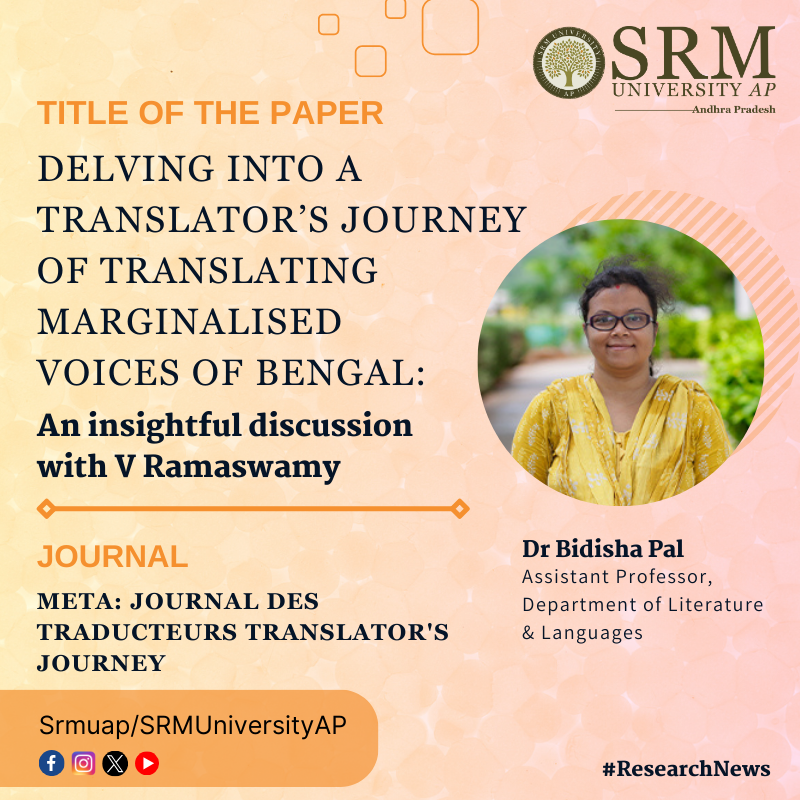
A translated work must retain the essence and flavour of regional culture and locales. A good translator tries to reproduce the particularities that are ingrained within the texts. On this note, Dr Bidisha Pal, Assistant Professor from the Department of Literature and Languages, has published a paper, “Delving into a Translator’s Journey of Translating Marginalised Voices of Bengal: An Insightful Discussion with V Ramaswamy” in Meta Journal des traducteurs Translators’ Journal. This research revolves around a discussion with the well-known translator V Ramaswamy, a noted name in Bengali Dalit literature and translation. Ramaswamy shares his thoughts on working on the translation projects that he enjoys doing and that establish the cause of the marginalised people of Bengal.
Abstract
In this interview discussion with Bidisha Pal and Md. Mojibur Rahman, translator V Ramaswamy focuses on the journey of his translation and tryst with the marginalised Dalit voice(s) in Bengal. He speaks about the writings that propel him to choose translating and to carry voice(s) beyond the Bengal arena, thus dissolving language barriers. The deliberate choice to translate various pieces representing various periods acts as a witness to his existence as an independent translator. According to him, translation is also a source of healing to deal with a tragic past and the complicacies that life often presents to him. He shares his experience translating Subimal Mishra, the powerful poet who speaks for marginalised people. Ramaswamy, as he states in the interview, makes a vow to translate Mishra’s whole writing career. He talks about translating Manoranjan Byapari, a Bengali Dalit prize-winning author and political persona who has also championed the Dalit cause in Bengal, Adhir Biswas, the story-writer and publisher of a publishing house in Kolkata Gangchil that publishes writings by those literary personas who do not fall, as such, into the category of the mainstream, Bangladeshi writer Shahidul Zahir whose revolutionary voice and zeal reverberate in the literary world of Bangladesh, as well as Ansaruddin, a writer and farmer by profession whose works Ramaswamy is currently translating. Despite not being a part of the literary world, Ramaswamy has built an intense connection with literature and has gradually become part of the world. For him, translation is something that has to remain faithful to the source text, especially if people are doing literary translation.
Practical implementation/social implications of the research
The research contains elements that are connected with the values of the society. It discusses the nuances of translation of the writings of marginalised people, which contain many unforeseen truths of society, and depicts the struggles for the existence of the people. The translator is doing a commendable job compiling the writing thorough translation that will act as a bridge to the unfamiliar audience who could feel connected with the marginalised people.
Dr Bidisha aims to publish many more articles in the diverse interdisciplinary fields of literature, edit books, and attend conferences.
- Published in Departmental News, English Current Happenings, English news, News, Research News
Unwinding the transgender travails
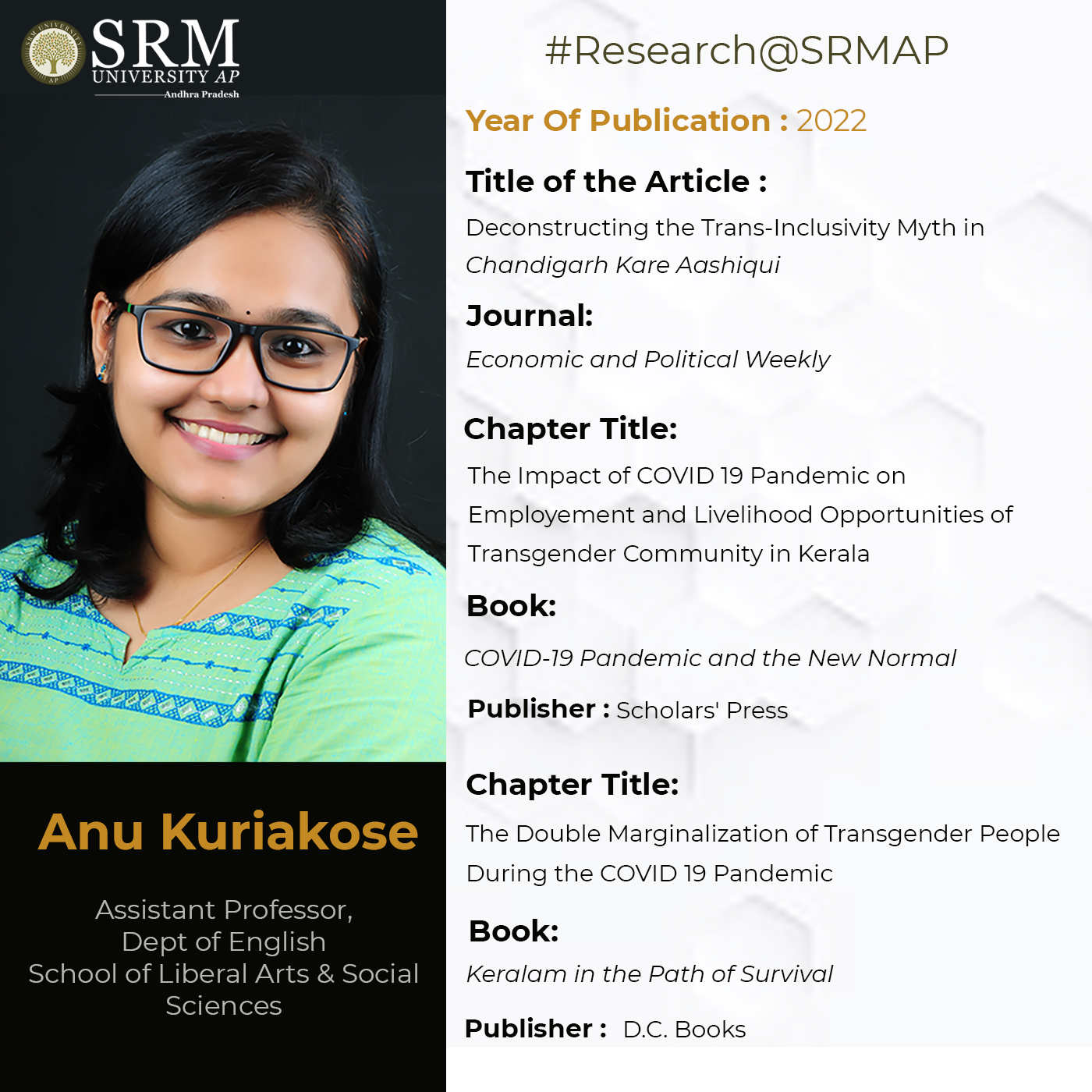
Embracing one’s transgender identity is a tremendous act of courage in a world that refuses to acknowledge their very existence. The narrations of their trials and tribulations continue to prevail despite the measures taken by the state machinery to assert their rights or the transgender revolution that spilt over in recent times. So long as the society continues to deny them a conducive space to exert their existence, the transgender community will have to endure hardships in all walks of life. The present-day researchers have increasingly shifted their focus on the LGBTQIA+ community to unravel their survival tales and awaken the population to their basic human rights.
Dr Anu Kuriakose, Assistant Professor from the Department of English, has also been looking into transgender lives and the anomalies in their representation. Her research analyses the inclusion and representation of transgender people in Indian films with a specific focus on the shift in representational politics and inclusive strategies in films of late. She has recently published a paper titled “Deconstructing the Trans-Inclusivity Myth in Chandigarh Kare Aashiqui” in the Economic and Political Weekly.
The article offers a critical reading of the Hindi film Chandigarh Kare Aashiqui (2021), which appears to maintain an inclusive outlook towards the queer community. Through the article, Dr Anu draws attention to the glaring presence of transphobic and homophobic attributes even in such progressive films. Her research attempts to analyse whether there have been any significant shifts in trans representation and inclusion in contemporary cinema.
She has also published two chapters, “The Impact of COVID 19 Pandemic on Employment and Livelihood Opportunities of Transgender Community in Kerala” and “The Double Marginalization of Transgender People During the COVID 19 Pandemic”, in the books COVID-19 Pandemic and the New Normal and Keralam in the Path of Survival respectively. The works recount the unspoken sufferings underwent by the transgender community in Kerala during the pandemic times. The chapters were co-authored by her peer, Dr Vinshi P K.
Her upcoming research plans include addressing gender diversity and inclusion in academic discourses in the vernacular of Kerala and critically reviewing the representational politics of trans femininity in visual cultural texts. By researching the portrayals of transgender community, Dr Anu intends to enhance awareness on the deviant representation of queer community in the realms of literature.
- Published in Departmental News, English Current Happenings, English news, News, Research News
Dr Anu Kuriakose bestowed with CM’s Nava Kerala Research Fellowship
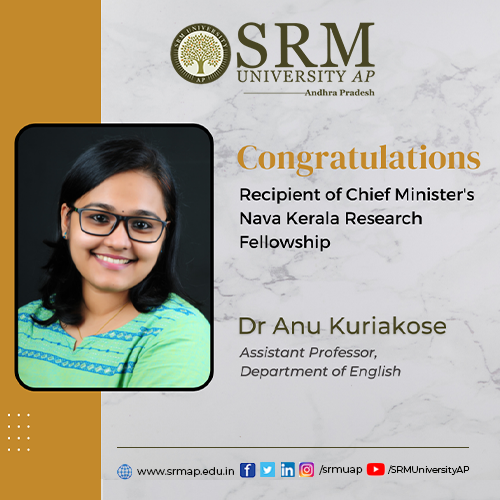
The Government of Kerala has chosen Dr Anu Kuriakose from the Department of English for the prestigious Chief Minister’s Nava Kerala Research Fellowship in the stream of Political Science, Historical Studies, Humanities & Liberal Arts. The award has been designed by Kerala Government to further the state’s development plans by promoting research across various disciplines. Dr Anu obtained the grant for her intriguing study in the domain of gender studies. She intends to look at the digital turn in the genderqueer movements in Kerala with a cross-cultural perspective from any specific locale in Europe.
There have been many research studies involving the examination of queer and trans representation in media. With the turn of the century, we witnessed a remarkable shift in the digital representation of the queer community.
Through her research “Dissenting Heteronormativity and Mainstreaming Identity: A Critical Assessment of the Digital Turn in GenderQueer Movements in Kerala”, Dr Anu is fixated on uncovering the digital collectives in which Malayali genderqueer people are also a part of and the digital turn in the genderqueer movement in Kerala, of late.
She expressed her delight over receiving this opportunity that could help her make substantial contributions to the state’s progress. “I feel proud and humbled for getting this title; my project aims to map the genderqueer movements, the digitally networked associations of which Malayali gender non-conforming people are part, and the nuances of their digital turn at present”, she said.
The Department of English, University of Calicut, has agreed to be a hosting centre for the research project. The GEXcel International Collegium for Advanced Transdisciplinary Gender Studies, Karlstad University Sweden, has also agreed to collaborate. She also wishes to make SRM University-AP a stakeholder in the same.
“I am hugely motivated by the weight SRM University-AP gives to research. From making collaborations to publishing papers in reputed journals and receiving grants from external bodies, the university has anchored as an encouraging platform to stimulate the research pursuits of its faculty and students”, she maintained. “I am truly indebted to my peers and everyone here for providing a conducive environment to fructify my research interests”, remarked Dr Anu.
- Published in Departmental News, English Current Happenings, English news, Faculty Achievements, News, Research News


